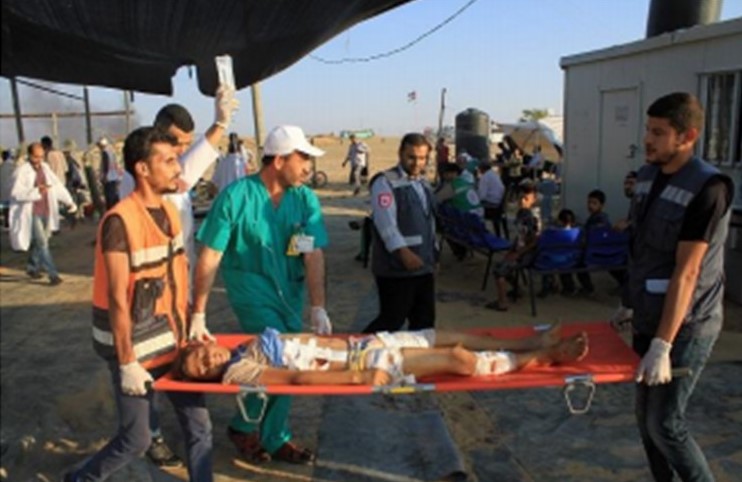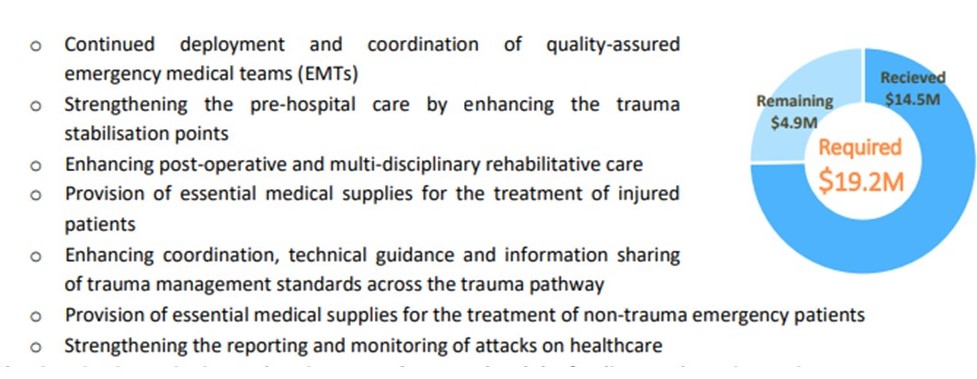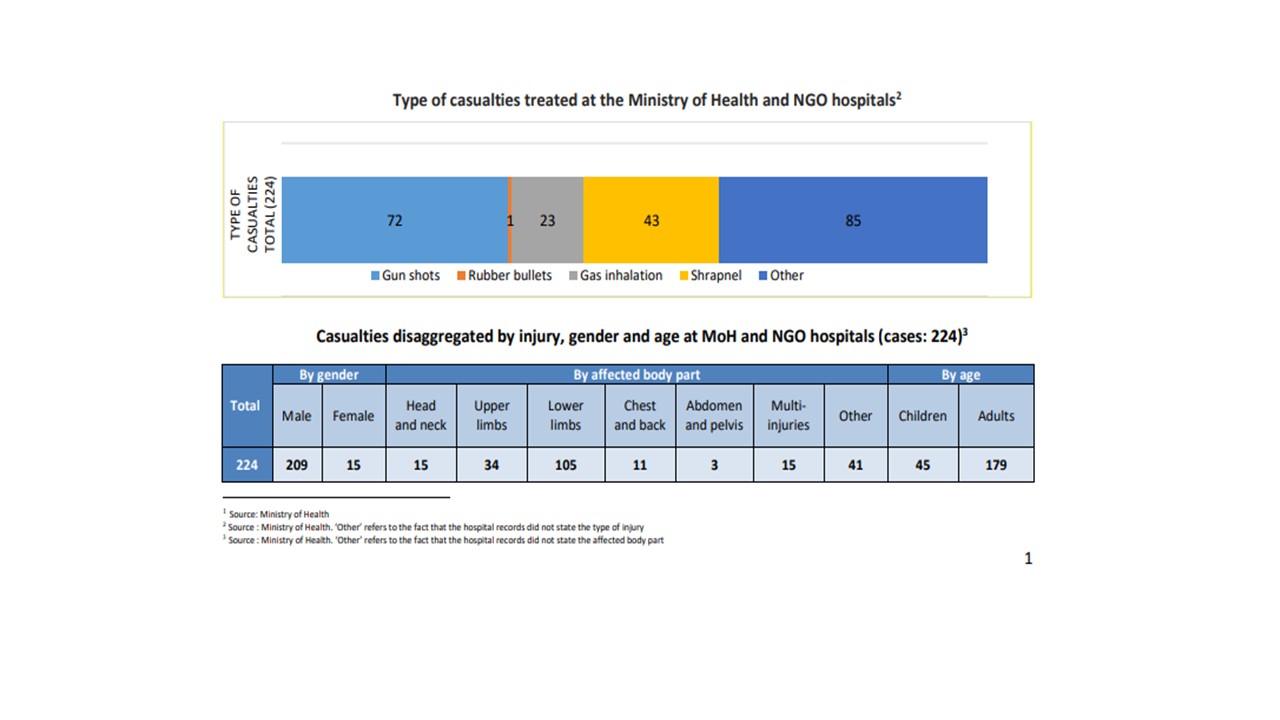Home > Posts > Aggressive policies and Apartheid
Situation Report: Occupied Palestinian territory, Gaza

World Health Organization
Highlights
- As of the 16th July, the latest figures provided by the Ministry of Health (MoH) indicate that 4 Palestinians were killed, including 3 children and 424 were injured by Israeli forces from 12th to the 16 th July.
- 2 people were killed (including one child) and 399 people were injured from the mass demonstration. An additional 2 children were killed and 25 were injured as a result of Israeli air strike at Al-Kateeba area west Gaza on the 14th July.
- Out of the 424 injuries, 224 required transfer to the MoH hospitals or to NGO clinics including 45 children, and 15 females. From the hospitalized injuries, 9 cases were critically life-threatening, 81 moderate, 121 mild, and the remaining 13 were unspecified cases1
- An additional 200 injuries were managed and discharged at the 10 trauma stabilization points (TSP) and primary healthcare centers. These TSPs are led by the MoH, and supported by the Palestinian Red Crescent Society (PRCS), and the Union Health Workers Committee (UHWC).
Caseload of casualties related to the conflict
- Casualties: Since the 30th March until the 16th July, 148 people have been killed. 146 were killed by Israeli forces during the demonstrations and 2
from Israeli airstrikes. - The figure of people injured amidst the conflict since the 30th March stands at 16,496. From this total, 7,801 were treated and immediately
discharged from the TSPs and the remaining 8,695 were transferred to a hospital. - Hospitalization: Out of the total 8,695 injuries that required hospitalization:
o 48% were live ammunition gunshot injuries, at a total of 4,190 cases.
o 1,410 were children (16%), 582 (7%) were female and 8,113 (93%) were male.
o 391 (5%) cases were critical, 3,992 (46%) were moderate, 4,150 (48%) were mild and 162 cases were unspecified.
Incidence of limb injuries:
- A total of 5,455 limb injuries have been hospitalized. This represents the highest type of injury at 63% of the total hospitalized injuries.
- Approximately 1,200 cases of injured people will be in need of limb reconstruction, and will require up to 7 surgeries and extensive rehabilitation and treatment for up to 2 years.
- Amputations: Since the 30th March until the 16th July, the total number of amputations was 68, including 14 children and 1 female. Out of this total, 60 were lower limb amputations and 8 were upper limb amputations.
- Paralysis: Since the 30th March until the 16th July, the total number of patients with paralysis due to spinal cord injury was 10 out of which, 2 with quadriplegia, 2 with hemiplegia with 5 paraplegia and with 1 monoplegia.
Impact on the Health Sector
- Patients are being discharged early every week to make room for the new wave of expected casualties. Approximately 550 patients have been discharged early since the 30th March. These patients are being requested to receive follow-up care at the MSF clinic, PMRS, UHWC and primary healthcare centers.
- Since the 30th March, according to the MoH approximately 7,000 elective surgeries have been postponed.
- According to Gaza’s Central Drug Store Ministry of Health, in June, 250 essential medicines out of the total 516 essential medicines list (48%) were at less than one month’s supply and 206 essential medicines (40%) were completely depleted at the MoH store in Gaza. In addition, 247 essential disposables out of the total 853 essential disposables list (29%) were at less than one month’s supply.
Attacks against health
- According to the Ministry of Health, PMRS, UHWC and PRCS, for the period of 11th – 16th July, 8 health workers were injured: one sustained a shrapnel injury; three were hit directly by tear gas canisters; and four were injured by tear gas inhalation, two of them losing consciousness.
- On the 14th of July 2018, at approximately 5:30pm an Israeli airstrike caused damage to many of the surrounding buildings, including the Ministry of Health central ambulance station and the Palestine Avenir for Childhood Foundation (PACF) Cerebral Palsy Center.
- The Ministry of Health central ambulance station was damaged, in addition to 15 vehicles. Of the vehicles, one ambulance was completely destroyed and there was partial damage to nine ambulances; three medical supply trucks and two transport vehicles were also damaged.
- Palestine Avenir for Childhood Foundation (PACF) Cerebral Palsy Center was damaged in the same incident. The centre offers services such as specialized education, physiotherapy sessions, psychological support and occupational therapy free of charge to children with cerebral palsy (CP). The damages affected all of PACF’s departments, including the destruction of windows, rehabilitation equipment, furniture and ceilings on all three floors. Shrapnel from the blast also left holes in the walls of the Centre. No staff were injured at the time of strike. The Director of PACF has estimated the cost of damages to be USD $ 120,000- 150,000. PACF had planned to conduct summer camps in the building for children with CP; this will now need to be relocated elsewhere. The Centre also had to postpone physiotherapy sessions for 40-50 children.
- Cumulative figures on attacks against health: o According to preliminary reporting, since the start of the 30th March to the 16th July; two health workers were killed, 363 were injured and 68 ambulances (including 10 damaged during the Israeli air strike on the 14th July) and one specialized healthcare center for people with disability.
o Of the health workers affected, 26 were injured by live ammunition, including the two health workers who were killed; 40 were hit directly with tear gas canisters; and 13 were hit with shrapnel.
Emergency Response
Providing medical supplies:
- MdM- Spain has procured and delivered one drug item for Nasser Hospital. They have also procured a variety of orthopaedic supplies and equipment for the orthopaedic department.
Trauma Management & Emergency Medical Teams (EMTs):
- The Palestinian Medical Relief Society (PMRS) provided first aid to 102 injured people, including 14 live bullet injuries. Since the start of demonstrations, PMRS has provided first aid to a total of 2,977 patients. PMRS has also mobilized five outreach teams in each governorate, to conduct post-operative care, including wound dressing and physiotherapy services. PMRS provided post-operative care to 24 new cases. To date, PMRS has provided postoperative care to 587 casualties, out of those, 139 have received assistive devices. PMRS is running one mobile clinic. The mobile clinic has visited 6 locations and served 510 patients; to date, the mobile clinic served 1,551 patients.
- Doctors Worldwide – Turkey (DWWT) provided 300 cases with 496 treatment sessions (nursing, physiotherapy and psychological support) in addition to drugs and assistive devices through their outreach program. DWWT has deployed a volunteer medical team from Turkey, consisting of 4 surgeons (2 orthopedic and 2 pediatric) and 1 anesthetist. The team conducted 10 orthopedic operations in Al-Shifa Hospital. On the 13th July, theteam provided treatment for 12 injuries at Al-Shifa's emergency department
- MdM-Spain deployed a medical team consisting of 2 pediatric orthopedic surgeons, 1 anesthetist and 1 operation theater nurse, to carry out elective surgeries at Nasser Hospital. The team performed a total of 19 surgeries, over the course of 4 days, and evaluated 77 patients. MdM- Spain has started an assessment of theorthopedic needs in preparation of procuring medical equipment.
- UNRWA provided 94 post-operative consultations offering treatment and wound dressing, including care for 83 gunshot injuries and 21 severe cases. Since the 30th March, UNRWA has provided a total of 3,250 postoperative consultations at their 22 primary healthcare clinics.
- The Union of Health Work Committees (UHWC) teams provided first aid and health services to 13 cases at their medical point in Rafah. In addition, Al Awda Hospital, with funding from Muslim Aid, was able to provide emergency services for 8 cases, including 7 surgical operations.
- Humanity and Inclusion (HI), in partnership with local organizations, have deployed 10 multidisciplinary teams in all the five governorates of Gaza. So far, HI has provided nursing and rehabilitation services to 721 persons with injuries who have received a cumulative total of 6,119 multidisciplinary sessions. HI has also distributed a total of 87 assistive devices, including wheel chairs, elbow and axillary crutches, and anti-bedsore mattresses.
- PRCS teams provided first aid services to 192 casualties including 1 who died, 51 live ammunition injuries, and 99 tear gas suffocation cases. Thirty three cases were hospitalized at Al Quds and Al-Amal Hospital. PRCS psychosocial support team provided Psychological First Aid (PFA) to more than 116 people. PRCS also activated 5 The National Disaster Response Team (NDRT), in which 65 staff and volunteers were deployed to the field to
assist 43 casualties. - Public Aid Hospital ambulances transferred 5 injured patients from the eastern border to Al-Shifa Hospital during the recent demonstration.
- Health Matters/IMC partners provided immediate care to a total of 90 injured cases at the TSPs; out of the 90 cases 55 received wound care and 35 were transferred to hospitals. Health Matters/IMC partner hospital provided post-operative wound care for 62 patients.
- ICRC will open a surgical ward (50 beds) at Shifa Hospital next week and it is expected to run for 6 months and perform approximately 720 surgeries.
Coordination and Information:
- A Health Cluster meeting took place in the West Bank on the 12th July, led by WHO as the lead agency and cochaired by the MoH. The meeting minutes can be found. Here: http://bit.ly/2NldR0U
- A Health Cluster meeting took place in the West Bank on the 12th July, led by WHO as the lead agency and cochaired by the MoH. The meeting minutes can be found. here http://bit.ly/2NldR0U

Funding needs
- From the 30th March until the 30th September the Health Cluster requires $ 19.2 million; from this total, to date $ 14.5 million has been mobilized, leaving a gap of $ 4.9 million12. The funding is necessary to support. The funding is necessary to support the following activities:

- The situation is continuing to deteriorate on the ground and the funding needs are increasing.


WRITE YOUR COMMENT